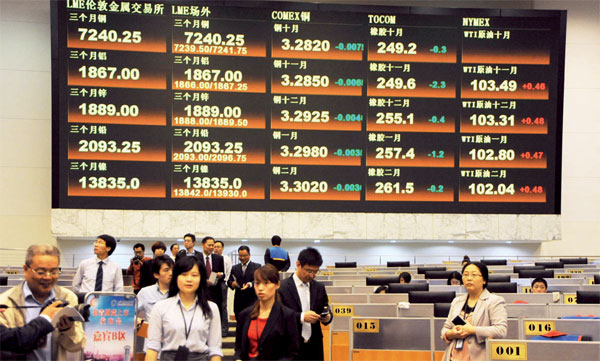Futures is here
Updated: 2015-08-07 09:22
By Cecily Liu(China Daily Europe)
|
|||||||||||
Chinese companies look to have bigger say in pricing global commodities
 |
|
The Shanghai Futures Exchange was established in 1999. China will launch the Shanghai International Energy Exchange, which will admit foreign traders. Photos provided to China Daily |
Chinese companies are increasingly trading in global commodities to secure long-term supplies and exert more influence over pricing mechanisms.
As one of the world's largest consumers of commodities such as agricultural products, metals, minerals, oil and gas, China has historically purchased these commodities from international markets at unfavorable prices due to lack of participation in international commodity exchanges, which set commodity prices.
But that's now changing as increasingly, Chinese banks, securities firms and commodity trading firms are joining international commodity exchanges, mainly to buy and sell commodities on behalf of their clients in China and helping them hedge against future price fluctuations.
For example, if a Chinese oil refinery knows the quantity of crude it requires in a year's time to meet production targets, it can purchase Brent Crude on the US-listed Intercontinental Exchange, or ICE, at a future price determined by the futures market. By receiving a locked-in price, the firm is able to accurately determine its business model and be certain of profit margins.
Before such trading activity became possible, the same company would have needed to either buy crude oil in bulk for storage, or wait a year until the oil is required, facing the risk of increased prices.
"It is natural for Chinese companies to take a more dominant position in the global commodity trading space both physically and financially because it is one of the biggest commodity consumers in the world," says Bjarne Schieldrop, chief analyst of commodities at SEB, a Nordic bank.
He says that in the commodity market, the fundamentals of supply and demand determine the long-term price, but in the short-term, on the day when a trade is made, the price is set by financial markets because market sentiment can move prices up and down.
"At the moment I think China is huge on the physical side while the rest of the world has dominance in the financial markets," Schieldrop says.
He says one of the reasons that China has historically not engaged in much commodity trading on financial markets was because it was highly focused on securing physical supplies.
In addition, China's capital account restrictions, which limit the amount and type of financial flows into and out of China, also has been a factor behind its limited involvement in international commodity trading. The liberalization of the capital account in recent years is now allowing more Chinese banks to trade on international exchanges, Schieldrop says.
Chinese companies' increased trade in commodities in foreign exchange is also a natural continuation of increasing Chinese investment and financing activities in the international commodity space, says Josh Clarke, counsel in the Perth office of the law firm Squire Patton Boggs.
Today's Top News
Xi's trip to herald 'golden decade' for relations
Wanda's chairman Wang again becomes richest Chinese
Ex-NBA star Odom reported critical, Kardashian at his side
Country house to add English tradition to Xi, Cameron meeting
Most Chinese cities failing air quality standards: Report
Xi to initiate 'golden era' in China-UK ties
China's September inflation cooler than expected
Sensible strategic move by Russia to give Assad support
Hot Topics
Lunar probe , China growth forecasts, Emission rules get tougher, China seen through 'colored lens', International board,
Editor's Picks

|

|

|

|

|

|






